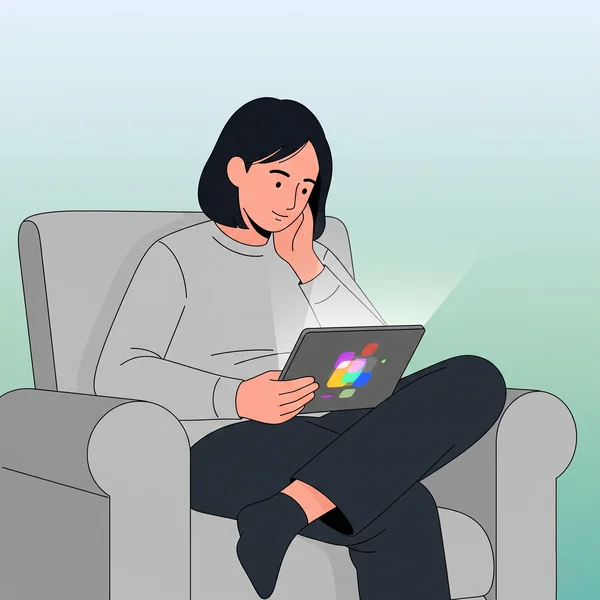How to Get Tested for Schizophrenia: A Step-by-Step Guide
Feeling worried or confused about certain thoughts and experiences can be an isolating journey. You might be asking yourself, how do you get tested for schizophrenia? The path to understanding and clarity can seem complex, but it doesn't have to be. This guide provides a clear, step-by-step roadmap, breaking down the entire process from initial concern to a professional clinical assessment. If you're looking for a safe and private place to begin organizing your thoughts, you can start with our confidential schizophrenia test.
Important Disclaimer: This Guide is for Informational Purposes
Before we proceed, it is crucial to understand that this article provides educational information and is not a substitute for professional medical advice, diagnosis, or treatment. A formal diagnosis of schizophrenia can only be made by a qualified mental health professional. The tools and information provided on schizophreniatest.net are designed for preliminary screening and to help you decide on your next steps.
Step 1: Taking a Preliminary Schizophrenia Screening Test

For many, the first step is often the most difficult. You may feel uncertain about what you're experiencing or how to articulate it. This is where an online screening tool becomes incredibly valuable.
Why an Online Test Can Be a Helpful First Step
Taking a well-designed online schizophrenia test can help you in several ways. It provides a structured format to review your experiences, helping you organize your thoughts around specific symptoms like hallucinations, disorganized thinking, or changes in perception. This process can make your feelings seem less overwhelming and more manageable. It is a completely private and low-pressure way to explore your concerns.
What to Expect from Our Confidential Schizophrenia Test
Our free schizophrenia test is based on established clinical screening questions. You will be asked a series of questions about your experiences over the past few months. Your answers are completely confidential. Upon completion, you will receive an instant report that summarizes your responses and indicates a potential risk level. Think of this not as a diagnosis, but as a helpful, personalized report to take with you to a professional.
How to Use Your Test Results Productively
The report from an online assessment test is a powerful tool for communication. Instead of trying to recall every confusing moment, you can share this structured summary with a doctor. It provides a concrete starting point for a productive conversation about your mental health.
Step 2: Consulting Your Primary Care Physician (PCP)

Once you have a better handle on your symptoms, the next logical step is to speak with your primary care physician (PCP) or a general practitioner.
How to Start the Conversation About Your Mental Health
Bringing up mental health concerns can be intimidating. You can start the conversation simply. For example: "I've been feeling unlike myself lately and took a preliminary screening test online that raised some concerns. I'd like to talk about it." Or, "I'm worried about some changes in my thinking and perception, and I need guidance on what to do next."
What Questions Will Your Doctor Ask?
Your doctor will likely ask about your symptoms, how long you've been experiencing them, your personal and family medical history, and any medications you are taking. They are there to help, so being as open and honest as possible is key.
Ruling Out Other Physical Conditions
An important part of schizophrenia testing involves ensuring that your symptoms are not caused by other medical conditions. Your PCP may conduct a physical exam or order blood tests to rule out issues like thyroid problems, substance use, or other neurological conditions that can mimic psychosis.
Step 3: The Referral to a Mental Health Specialist
If your PCP suspects a serious mental health condition, they will refer you to a specialist for a comprehensive evaluation. This is a standard and positive step toward getting the right help.
Psychiatrist vs. Psychologist: Who Should You See?
You will likely be referred to a psychiatrist or a clinical psychologist.
- Psychiatrists are medical doctors (MDs) who can diagnose mental illness, provide therapy, and prescribe medication.
- Clinical Psychologists (Ph.D. or Psy.D.) are also qualified to diagnose and provide therapy but typically do not prescribe medication.
Both are highly trained in conducting the necessary
tests for schizophrenia.
Preparing for Your First Appointment
Bring your online test report, a list of your symptoms, any questions you have, and a list of current medications. It's helpful to be prepared, but remember, the specialist will guide you through the process.
Step 4: The Comprehensive Schizophrenia Assessment Process

A formal schizophrenia diagnosis test is not a single test but a thorough assessment process. This is what a specialist will typically do to get a complete picture of your health.
The In-Depth Clinical Interview
The specialist will conduct a detailed interview with you (and possibly with your permission, your family) about your symptoms, life experiences, developmental history, and daily functioning.
Psychological Evaluation and Cognitive Testing
This may involve structured interviews, questionnaires, and specific tests for social schizophrenia diagnosis to assess your thinking patterns, emotional responses, and ability to perceive reality accurately.
Reviewing Personal and Family Medical History
Understanding your full medical background, including any family history of mental illness, is a crucial part of the diagnostic puzzle.
Using Diagnostic Criteria (like DSM-5)
Ultimately, the specialist will compare your symptoms and history against the established criteria in the Diagnostic and Statistical Manual of Mental Disorders (DSM-5). A diagnosis is made only when specific criteria are met over a certain period.
Taking the First Step is the Bravest Step
Navigating the path to a mental health diagnosis can feel daunting, but it is a journey toward understanding and well-being. By following these steps—from taking a preliminary online screening to engaging with medical professionals—you are taking control of your health. Each step, especially the first one, is an act of courage.
If you are ready to take that first brave step, we invite you to use our confidential and free schizophrenia assessment test. It is a simple, informative tool designed to empower you on your path to clarity.
Do you have any experience with this process that you'd like to share? Your comments below could help someone else feel less alone.
Frequently Asked Questions About Schizophrenia Testing
Is there one single "test" for schizophrenia?
No, there isn't a single blood test, brain scan, or questionnaire that can diagnose schizophrenia on its own. The diagnosis is a comprehensive process involving clinical interviews, symptom evaluation, and ruling out other conditions. An online tool can be a great starting point, but it is not a final schizophrenia diagnosis test.
How long does the schizophrenia testing process take?
The timeline can vary. The initial consultation with a PCP can be quick, but the full assessment by a specialist may take several sessions over a few weeks to ensure an accurate and thoughtful diagnosis.
Can I be forced to get tested for schizophrenia?
In most situations, an adult cannot be forced into a psychiatric evaluation unless they are determined to be an immediate danger to themselves or others. The process described here is voluntary and centered on you seeking help for yourself. If you have any concerns, learning more with our free online assessment is a completely voluntary and private option.